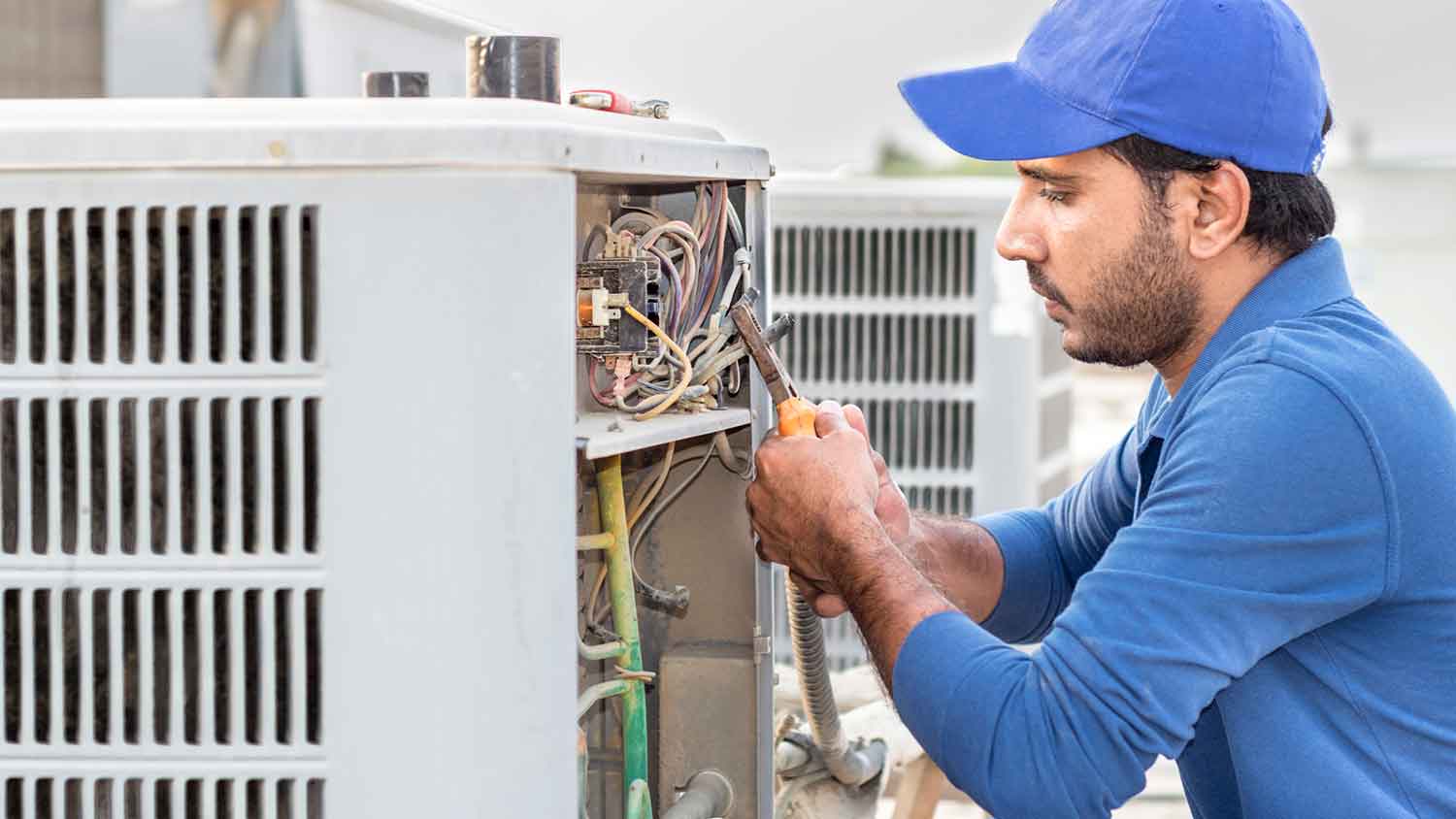Does HVAC Tuning Prevent Heat Pump Failure?
Regular maintenance can help your HVAC system hit all the right notes


HVAC tuning includes an inspection, cleaning, testing, and providing adjustments.
Regular HVAC tune-ups have several benefits, including extending the lifespan of your system and identifying potential problems.
Tune-ups can prevent heat pump failure by identifying issues that could harm the pump or discovering repairs before it affects the pump.
HVAC tune-ups should be conducted twice per year.
If you’re wondering whether HVAC tuning can prevent heat pump failure, the answer is yes—taking into account the age of the system and how well it’s been maintained. Whether you have a brand-new HVAC or one that’s several years old, it can benefit from an annual inspection and tune-up before the summer months force the unit to work overtime. Let’s review additional benefits of HVAC tune-ups and how they can prevent heat pump failure.
Whether you’re adding a heat pump to an existing or brand-new home, it’s best to hire a professional heat pump installer for this task. A pro will have the right tools, skills, and experience to ensure this essential appliance is set up accurately and efficiently.
How a HVAC Tune-Up Affects Your Heat Pump
Its name may give you the impression that it only works in the colder seasons, but your heat pump works year-round as it switches from heating and cooling modes. This workload means it’s more susceptible to damage, but an HVAC tune-up can identify any issues early or help maintain the health of the pump by making sure the pump’s key components are working properly. While your local heat pump repair specialist can inspect your heat pump specifically, you can hire a HVAC professional to identify any other issues and treat the unit as a whole.
What Does an HVAC Tune-Up Include?
An annual HVAC tune-up costs anywhere from $75 to $200, depending on the type and size of the HVAC unit. With this fee, you can expect to have the following tasks completed by your local HVAC technician.
Inspection
A licensed technician will look over your HVAC system to ensure everything is working properly and is in decent condition. They’ll also check your refrigerant levels and make sure your thermostat is reading the temperature correctly and is responding accurately to any changes. The pro will also examine the heat pump to ensure it’s working well and not blowing hot air.
Cleaning
The pro will clean your evaporator and condenser coils, which prevents them from overheating and can improve their efficiency. Your HVAC’s condensate drain lines will also be cleared to keep water damage and mold growth at bay.
Testing
The HVAC technician will run your system through a complete cycle to test how it runs, starts, and stops. For example, they’ll ensure the heat pump fan is spinning correctly. They’ll also measure the difference in the temperature of the air entering and exiting the unit to make sure it meets the manufacturer’s standards.
Adjustments
Once all the cleaning and testing is complete, the professional HVAC specialist will make any adjustments, such as tightening connections and calibrating controls to optimize its efficiency and ensure it runs smooth until the next inspection.
Benefits of an HVAC Tune-Up

The benefits of an HVAC tune-up are plentiful, especially if you live in a particularly hot or cold region that forces your system to work extra hard. Benefits of a yearly HVAC tune-up include:
Enhanced efficiency
Extension of HVAC lifespan
Reduced wear and tear
Proper airflow and ventilation
Consistent temperatures and humidity levels
Early detection of HVAC problems
Checks for carbon monoxide levels
Cleaner filters and coils
How Often Should I Get an HVAC Tune-Up?
We recommend scheduling a tune-up twice per year, depending on the type of HVAC set-up. You’ll want to have your heating system professionally inspected before winter to ensure it’s well equipped to keep you warm, and you’ll want your cooling system inspected in the spring before the temperatures rise in the summer. This timeline helps extend the life of your HVAC system and identify repairs or needs before the peak season when prices escalate.
Frequently Asked Questions
The most common causes of heat pump failure include refrigerant leaks, dirty coils, blocked airflow, electrical issues, and thermostat malfunctions. If you hire a heat pump or HVAC professional to inspect your system annually, you can catch some of these problems with your system before they escalate to major (and expensive) issues.
The cost to repair or replace a heat pump ranges from $160 to $650, depending on the part that requires repair or replacement. Consult your HVAC or heat pump professional to get an accurate price quote based on your system’s type, size, and scale of the repair or replacement needed.





- Furnace Repair
- Air Conditioning Repair
- HVAC Repairs
- Furnace Installation
- Wood & Pellet Stove Repair
- Dehumidifier & Humidifier Repair
- Heat Pump Companies
- Swamp Cooler Repair
- Wood Stove Services
- HVAC Companies
- Commercial A/C Repair
- Geothermal Installation
- Air Conditioning Installation
- Boiler Repair
- 24 Hour Furnace Repair
- Geothermal Repair
- Heat Pump Repair
- Humidifier Installation
- Thermostat Repair
- Thermostat Installation
- Nest Installation
- Heating & Cooling
- Heating Repair
- Furnace Cleaning
- Furnace Tune-Up
- HVAC Technicians
- Subcontractors
- Furnace Maintenance
- Plumbing & Heating Companies
- Wood Stove Inspection
- Mini Split Installation
- Wall Heater Repair
- Duct Installers











